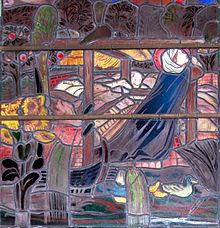Frideswida

Saint Frideswida (also: Friðuswiþ , Frevisse and Fris ; * around 650 or around 665 or the end of the 7th century or around 700 in Oxford , Oxfordshire ; † October 19, 727 or around 735 in Oxford or Binsey , Oxfordshire, England ) was According to legendary reports from the 12th century, daughter of the Saxon sub-king Didan (Didianus) of Berkshire from the House of Wessex and his wife Safrida .
Frideswide evaded the arranged marriage to Prince Aelfgar of Mercia ( Earl of Leicester ) by fleeing to Oxford. There, exactly in Binsey near Oxford, she founded a monastery .
There is evidence of a pen that was created before 1066 by secular canons under their patronage in Oxford. A much-visited pilgrimage developed in the Middle Ages to the collegiate church consecrated to her with its reliquary. In 1546 the collegiate church became the cathedral of the Anglican Diocese of Oxford .
Frideswide is the Patroness of the City and University of Oxford. Her relics are also found in Reading Abbeys, New Minster (Winchester) and St George's Chapel in Windsor. In France , too, her cult can be found in Bomy (Therouanne diocese). In iconography she is shown in the habit of an abbess , with a book or a flower.
The feast day of St. Frideswide is in the Catholic Church on October 19th , the feast of Translatio on February 12th.
Individual evidence
- ^ A b Entry in the Catholic Encyclopedia , Robert Appleton Company, New York 1913.
- ^ A b c David Nash Ford: Royal Berkshire History , St. Frideswide - folklore or fact? , on berkshirehistory.com, viewed Aug 11, 2010
- ↑ a b c d e Ekkart Sauser : Frideswida. In: Biographisch-Bibliographisches Kirchenlexikon (BBKL). Volume 17, Bautz, Herzberg 2000, ISBN 3-88309-080-8 , Sp. 405-406.
| personal data | |
|---|---|
| SURNAME | Frideswida |
| ALTERNATIVE NAMES | Friðuswiþ; Frevisse; Fris |
| BRIEF DESCRIPTION | English abbess and saint |
| DATE OF BIRTH | around 650-700 |
| PLACE OF BIRTH | Oxford , England |
| DATE OF DEATH | October 19 at 727-735 |
| Place of death | Oxford , England or Binsey , England |